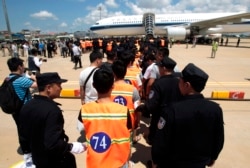Cambodia will receive new biometric surveillance and DNA screening equipment as part of its latest deal reinforcing law enforcement cooperation with China, prompting a leading human rights group to call for the government to come clean about its plans for the technology.
The deal was signed last week in an online meeting between Cambodian Interior Minister Sar Kheng and Chinese Public Security Minister Zhao Kezhi. It also includes funds for the new National Police headquarters.
“The Chinese side shall provide security regulatory equipment, crime-scene probing tools, DNA screening equipment, and autopsy tools, as well as speeding up the process of constructing the facilities of Cambodian National Police’s central commanding headquarters,” reads the deal – seen by VOA Khmer.
China’s domestic use of high-tech tools to monitor its citizens, including biometric identification and DNA collection in restive province of Xinjiang, have raised concerns about privacy, discrimination, and potential targeting of dissidents along with legitimate criminals.
As China expands its economic reach abroad, observers have warned that these invasive technologies would follow.
“Chinese-funded ports and railways will not necessarily undermine democracy in host countries,” wrote Hiroyuki Akita, a foreign affairs analyst for Nikkei Asia, in 2019. “But sophisticated systems that let authorities to keep tabs on people could see countries with immature democratic institutions morph into dictatorships.”
Chak Sopheap, executive director of the Cambodian Center for Human Rights, expressed concern that China’s next-generation technology could affect the rights to privacy of both Cambodian and Chinese people living in the Kingdom – especially those who do not support the governments.
“The government must execute the plan in a transparent manner by disclosing the goals and the objectives of this kind of cooperation,” Chak Sopheap said.
Chinese diplomats have recently expressed concern about illegal activities such as online scams being carried out by Chinese criminals living in Cambodia.
Interior Ministry spokesman Gen. Khieu Sopheak said human rights and privacy is not a higher priority than security, noting that the United States also equips law enforcement with surveillance and data collection tools.
“In ruling a state, if we focus merely on human rights, the state will be unstable and prone to terrorism,” Khieu Sopheak told VOA Khmer. “For that, ruling a state, same for the U.S., must have this to ensure those who wish to overthrow the government or to plant a bomb are caught beforehand.”
China has also installed more than 1,000 CCTV cameras in Phnom Penh since 2015, when it provided $3 million for a new surveillance system in the capital city. And earlier this year, Cambodia’s National Police announced that China would "assist on installing security cameras nationwide,” according to FreshNews.
Under the deal signed Sept. 28, law enforcement agencies in both countries will also provide mutual support for the Beijing Winter Olympics 2022, Cambodia’s ASEAN chairmanship in 2022, and the Southeast Asian Games 2023 in Phnom Penh, according to Khieu Sopheak.
He added the deal also includes the cooperation to combat “narcotic trafficking, terrorism, illicit armed trade, human trafficking, transboundary organized crimes, online gambling, and internet scams.”
Cambodia is seen as Beijing’s closest ally in Southeast Asia. Chinese Foreign Minister Wang Yi visited Phnom Penh, the Cambodian capital, earlier in September to officially hand over a $150-million stadium, a $270-million grant, and three million COVID-19 jabs.
During a meeting with Cambodian Deputy Prime Minister Hor Namhong, Wang Yi also urged Cambodia to stem the impacts of online gambling and crime involving Chinese nationals, so that it does not damage relations between the countries.
Cambodia announced a ban on online gambling in 2019, under pressure from China to reign in related criminal activity among Chinese nationals living in Cambodia.
However, recent media reports suggest continued internet ransom and scamming rings involving Chinese nationals, including illegal confinement of victims, often operating out of the coastal city of Sihanoukville.










